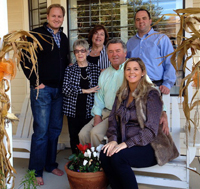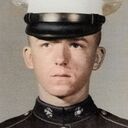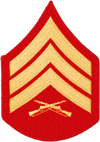Please describe who or what influenced your decision to join the Marines?
Growing up in San Francisco, you would not think there was neighborhood youth that wanted to join the Corps. This was not the case with our lads. With the untimely passing of my Mother when I was 16 years old, I followed the other, older friends into the Corps.
With a father in the Merchant Marine in World War 2, uncle in Korean War, and a grandfather in World War 1, it seemed the right way to follow JFK’s clarion call to “Ask not what your country can do for you, ask what you could do for your country.” I sought out my ‘missing in action and responsibility’ father to sign my paperwork and joined on my 17th birthday. The school would have to wait.
Platoon 1053 at MCRD San Diego awaited me in August 1967. graduation from boot camp in October 1967 found 95% of us with Westpac Ground forces order for February 1968. Staging, School Battalion for my 1833 MOS as an amtrac crewman in December 1967. There I met my lifelong friends: two “good ole boys” from Mississippi, Ray Morris, and William Woolfolk. We went through school and on to Staging Battalion also at Camp Pendleton.
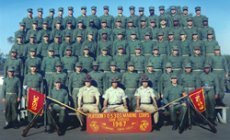
At Staging Battalion, they culled the 17-year-olds out for regulations allowed only 18-year-olds and older to go to Vietnam. This was due to high profile incidents where 17-year-olds were killed in Vietnam, and the stories in the press were not putting the Corps in a good light. Put on a working party with other age deficient Marines. At the end of the day, I simply returned to my group, and nothing further said. I did not want to be left behind, and I was happy to blend back in.
February 14, 1968, on Valentine’s Day, found us on a flight to Okinawa for the three-day layover then “down south” to Da Nang. Arrival at the transit center in Da Nang, we processed to our units. I was assigned to the 1st amtrac battalion at Cua Viet, which meant a flight to Dong Ha. The C-130 landed very close by. It offloaded a number of body bags containing fallen Marines from up north, which brought the reality of war on a visual scale.
We flew up to Dong Ha but were unable to land due to heavy ground fire and artillery incoming on the airstrip. Returning to Da Nang, I spent a fitful night in a transient nearby a 175mm arty battery that came with H&I intervals and fire missions. The next day we again flew in a C-130 to a quick landing at the tarmac. With the ramp down and our seabags thrown ahead of us, we, about seven replacement Marines, exited a taxiing aircraft that took off soon after due to incoming possibilities.
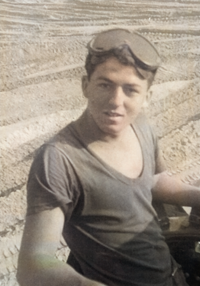
Aircraft at Dong Ha and Khe Sahn during this time were prized targets by the NVA arty spotters and therefore moved on quickly. The transit center there was an eye-opener as rotating Marines from Khe Sahn were passing through to go to Phu Bai and rotation home. I was in awe and a bit frightened by these red dust-covered, battle-hardened Marines. One, I had a long talk with, was very modest and pleased to be going home. The NVA 782 gear he sported with an NVA belt buckle told me all I suspected as I wondered what this rail-thin young Marine’s Mother was going to think when he finally arrived home; gaunt and tired.
Down to the boat ramp at Dong Ha, by this time alone as the others caught rides to their respective battalions, I asked for a ride aboard a USN Mike boat heading upriver. In the middle of the Cua Viet River, some miles upstream from Dong Ha, there was a Mike boat upside down with the hull sticking out of the water. The navy crewman, when asked, told me it had hit a large water mine placed in the traffic area. I slid below the gunwale that afforded protection as some of the grunts aboard reacted to some stray small arms fire. I noted their professional composure and fire discipline as they surveyed the area looking for targets. Having no weapon of my own and just a seabag, I felt totally inept. Not even having a K-Bar to use!
Arrival at Cua Viet check-in, I was sent to Bravo Company 4th platoon. While doing the check-in, we were warned of 152 mm artillery from the NVA that could come at any time. Sure enough, not too long after that, a barrage welcomed our small group of replacements, and a sprint to the bunkers was in order. After a suitable period of all clear, we again resumed our check-in. The armory stop found this hooch had been hit, and the armorers were busy cleaning up the mess the round had dealt their hut. I finally received a rifle at the armory from the pile and did a quick fam fire into a sand-filled 55-gallon drum to ensure it worked. An old flack jacket and a few magazines were also given. No helmets were available, but soon thereafter, I was given one from a recent casualty. The headband was broken from where he had fallen, so a new one was provided.
More arty came later in the day, and bunker crawling ensued. By now, I was a bit rattled, as you might imagine. I was called to the perimeter watch that evening. I did not know what to expect. I was soon finding myself in the Bravo Company office where my age was recognized and told to report to the bunker for the evening. I was to be off in the morning to Phu Bai to the 3rd Marine Division headquarters. Down the scary river again with once more without a weapon as it was checked back into the armory that morning. The fight from Dong Ha to Phu Bai was aboard a small “tail-dragger” aircraft as any means of transport were used on a first available basis. A very polite Captain gave me orders to Okinawa and said I could return when I was 18.
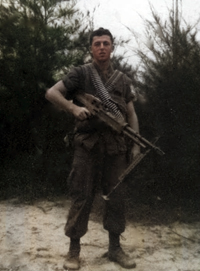
C-130 to Okinawa, where a number of grunts from 1/27 were also staged. There were on the float from Hawaii when their BLT 1/27 was sent ashore during this Tet offensive. Their 17-year-olds were corraled and sent back to Okinawa to await their birthdates as well. We were all put into the FSR (Force Service Regiment) in supply duty to help with getting materials down south to Vietnam. As each Marines’ birthday came up, they were issued orders to join their battalion back in Vietnam. Over a number of days and months, they all received orders, on their birthday, to head back down south. Unfortunately, we were able to see the casualty list in the Stars and Stripes and noted a number of these fine Marines in the coming months. The youngest of these was me. All of them were gone, but me.
All the while in Okinawa, I felt the deepest sense of guilt for leaving Vietnam, and it hung with me all of my days there as I awaited my hopeful orders to return to Vietnam. It seemed the longest time (months) since the last of the 1/27 Marines had obtained their 18th birthday and had left for their unit in Vietnam. All the while, my fellow Marines kept telling me that I was stuck there for the duration of my 13-month tour. This was dismaying to me, and I longed to be free to go.
Lo and behold, in the days before computers, my orders south came in on my birthday. I soon found myself flying back down to Da Nang with orders to, above all things, 1st battalion 27th Marines. Since I was an amtrac MOS, I politely asked the Corporal at the transit center if I could go to 3rd Amtracs now that I was in the First Marine Division. It was fine with him and made sense, so off I went to the Marble Mountain area, south of Da Nang, to report to the amtrac battalion. Not nearly as exciting as my trip upriver to Cua Viet, but I arrived at Battalion headquarters and asked for assignment to Bravo Company and 4th platoon where my good Mississippi friends were. It was grand to be back in their company. I was the long, lost prodigal son who returned to duty.
Whether you were in the service for several years or as a career, please describe the direction or path you took. What was your reason for leaving?
Before my February 1968-March 1969 tour was completed, and I was back in Vietnam, I extended for six months and enjoyed a 30 day leave back at home in San Francisco. I returned to Vietnam and again rotated home in October 1969.
I had the ability to get orders to Marine Barracks 8th and I street in Washington, D.C., but at the time, I thought it to be too “squared away” for a returning Vietnam Veteran. A decision I have regretted all of my days as I thought to myself, “What if I had gone there, and how would my life be today?”
Then off to Camp Pendleton and NCO School as permanent personnel. I advanced in rank and was an E-5 Sgt at 19 years old. I was discharged in January 1971 at 20 years old, having completed nearly four years of service. I left on a hardship discharge to take care of my younger brother, who had been sent to Hanna Boys Center after the untimely death of our Mother back when I was 16 years old and he 12. He was still a minor, and I was released to help him.
I began a career of over 44 years in September 1974 at Pacific Gas and Electric as a groundsman and advancement, through an apprenticeship, to Lineman and retiring in September 2018 as an electric crew foreman. I was married in the year 1980, where my wife Marla lives in Northern California. We have two children, Owen and Monica were born to us.
Two years later, with a break for the MI Advanced Course, before deployment to Vietnam in 1968, I was enrolled in the Defense Language Institute (Vietnamese), Fort Bliss, TX. My duties in Vietnam were in the J2 Exploitation Section. My responsibilities were overseeing and reviewing interrogations of POWs and those rallying to the RVN cause. Having much experience in intelligence collection sent me to the Navy. In 1969 I was posted to the Naval Amphibious School, Coronado, CA, as an instructor and head of the intelligence department.
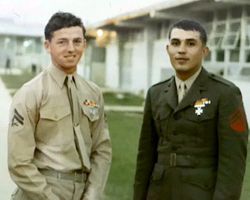
If you participated in any military operations, including combat, humanitarian, and peacekeeping operations, please describe those which made a lasting impact on you. Were they life-changing? In what way?
Vietnam service was described in the first question with detailed relevance to how I entered Vietnam, left for a time, and returning to do an extended tour. I find this writing to be the most important as it was quite different from the usual arrival in Vietnam. I did participate in several operations with infantry battalions of the 1st Marines and 5th Marines. We transported men, materials, water, c-rations, ammo, fuel, and a number of other things.
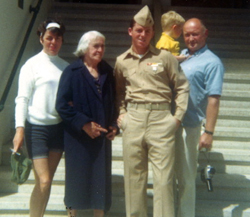
We provided security through and including area patrols on foot and night-time patrols around the Marble Mountain area. As Marines, we were all riflemen in our basic details. We were especially vulnerable to land mines, and a number of our casualties and the grunts were from just such encounters. I will not go into details on my days but affirm at this time and past that my admiration for the infantry, our beloved “grunts,” will forever be with me. These young and humble lads were a credit to their families, themselves, and our beloved Corps.
Did you encounter any situation during your military service when you believed there was a possibility you might not survive? If so, please describe what happened and what was the outcome.
Most days, the thought of hitting a mine was our biggest concern as we had seen much evidence of such calamities. That and the idea of not hearing gunfire above the engine noise was also a concern.
The most vivid times were two evenings where sappers had broken through the wire and were throughout the compound. A fellow Marine, a Sgt, had grabbed my rifle above my bunk in his hurry to react, and I could not find a weapon to save my ass. I was terrified I would get hit without a weapon. I couldn’t find a pistol or anything, and they were in the compound.
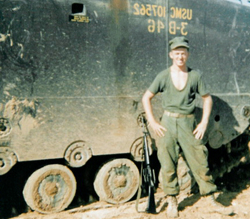
Another time was swimming out to a sunken amtrac to try to attach a tow line on it to extricate it from the river. They opened up on the other side of this wide river, and the rounds were dancing on the water like in the movies. The maintenance Warrant Officer and I did well in swimming back all the while diving, coming up, and diving again. The rounds sounded like angry bees going over your head.
Of all your duty stations or assignments, which one do you have fondest memories of and why? Which was your least favorite?

The best was my time with Bravo company 4th platoon in Vietnam, south of Da Nang TAOR. It was dramatic, but it was exciting times for an 18-year-old.
The least favorite time was back in Camp Pendleton. Many were let out early, and I had a MOS that did not allow that. There was racial strife amongst the troops, discipline problems, and a lack of Espirit de Corps that made the Marines be a challenging ordeal. It encompassed the Officers as well. Quite simply, the Corps did not know what to do with us or, indeed itself. Vietnam was winding down, and Garrison duty was boring for a number of us. The onset of PTSD was showing up in ways. Early outs should have been enhanced.
From your entire military service, describe any memories you still reflect back on to this day.
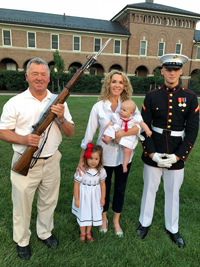
There is a particular pride in being a Marine and taking part in the Vietnam War.
For many years, the Vietnam Veterans came home to a country that was not accepting our time there for very good reasons entirely, and we were treated like pariahs.
In my later years, thinking of what all of the Marines have accomplished working careers, family life, and healthy attitudes compared to what we went through, gave me the respect for the Corps to this very day.
Many of us young men (even boys back then) needed structure in our lives. The sound and seasoned Officers and noncoms provided this avuncular tier that emphasized the importance of Duty, Honor, and Country. Their leadership has carried us through our working careers, and this is so evident amongst our fellow workers who had the “mission accomplished” attitude in their solid work ethic.
I still remember an old Master Sgt who, after finding out we were cited for trespassing by the sheriff, insisted on going to court with us in Orange County, California. We had been swimming with some Hippie girls at remote hot springs, and we were all cited. This “top Sgt” talked to the judge and had the charges dismissed. It was painful to see the Hippie girls and guys not even thank this man as they left the courtroom. I will never forget this seasoned warrior for looking out for his men as the Corps was always known to do. Bless this man for being there for us.
What professional achievements are you most proud of from your military career?
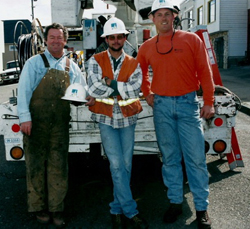
Obtaining the rank of Sgt at only 19 years of age.
Having the discipline and work ethic that was required to be a good Marine carries over into my journeyman career as an electric lineman. With the focus of following the safety rules and directing those in my charge to do as well may never have won popularity contest, but it ensured that we, as in an old Corps saying, “Went out in tacked and did not come back tacked in!” These structured leadership qualities paid off. Through the years, younger linemen would be grateful for having been under stricter guidelines requiring work in a craftsmanship manner with due diligence to safety. I thank the Corps for fomenting these virtues in me.
Of all the medals, awards, formal presentations and qualification badges you received, or other memorabilia, which one is the most meaningful to you and why?
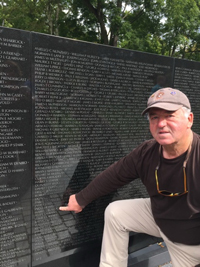
Vietnam Service. It acknowledges I was there in the company of my fellow Marines who heard the “bugle call” and answered it. In gratitude for the 58,000 plus, who I share this, with who are forever emblazoned upon the Wall in Washington D.C.
Which individual(s) from your time in the military stand out as having the most positive impact on you and why?
I would have to say Major Molineaux of Bravo Company, who I witnessed under fire. This tough “Irish Mick” from Boston was cool under fire, called in artillery spot on, and always provided the leadership we came to guide on.
Captain David Sconyers of Alpha company 3rd Amtracs who I came to admire over our reunion years. An Officer and a Gentleman.
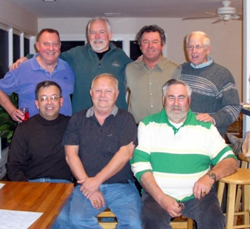
List the names of old friends you served with, at which locations, and recount what you remember most about them? Indicate those you are already in touch with and those you would like to make contact with.

William Woolfolk of Bravo Company 4th Platoon in Vietnam. We are still in contact to this day. My “good ole boy.” Lives in Jacksonville, Florida.
Ray Morris, another Mississippi lad who parted this world a few years ago. he always called me his “little brother.” Still in touch with his daughters.
Dean Mattern, who we had such a fine friendship in Camp Pendleton during our garrison days at Camp Pendleton. We still stay in touch.
David Cox of Bravo Company in Vietnam. We, fellow Bravo Company members, are still looking for him. Great lad!
Can you recount a particular incident from your service, which may or may not have been funny at the time, but still makes you laugh?

We were in Vietnam at a Korean Marine outpost. One of the guys had ordered one of these sex blow up dolls as a gag. This was in 1968, and a real novelty. After it was blown up and we laughed for a bit, it was put on the ground, and a bunch of guys shot it full of holes with their M-16 rifles. It may sound crazy, but that was the temperament of the day. I guess you would have had to be there to appreciate the gallows humor in it!
What profession did you follow after your military service, and what are you doing now?
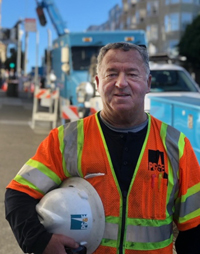
I was retired in September 2018 after 44.08 years as an electric crew foreman (Lineman) at Pacific Gas and Electric Company in San Francisco. It was a great career in a top-notch Company, and I am grateful for my time served there. A linemen job is not for the faint of heart, but there was quite a bit of satisfaction in working with voltages of all levels, maintenance, and restoration to customers in all kinds of weather conditions.
Travel with travel agent wife since retirement included, but not limited to, a 36-night cruise Sydney to Sydney circumnavigation of Australia, Trips to Ireland, African 10 night safari to Zimbabwe and Zambia, followed by a 15-night cruise from Buenos Aires to Antarctica with the return. We enjoy travel, as you can imagine.
What military associations are you a member of, if any? What specific benefits do you derive from your memberships?
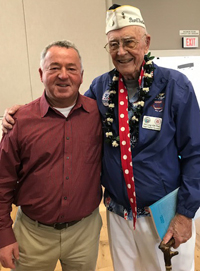
VVA Chapter #547 Marin County, California (Vietnam Veterans of America) Board member. Enjoy meeting with fellow Veterans of all service times.
In what ways has serving in the military influenced the way you have approached your life and your career? What do you miss most about your time in the service?

The influence, leadership, and obligations obtained in the service years have formulated a lifelong manner of social responsibility. Life long learning has been vital while in the service and beyond.
In the service years, you had to be 21 years old to vote. You could carry 300 rounds of ammo, blocks of C-4 explosive, and decide to blow a bridge if you deemed it warranted but could not vote. Since I turned of voting age, I have been diligent in taking this responsibility very seriously, being an informed citizen, and preaching the merits of this to junior generations.
Miss the camaraderie of fellow young people in our military days.
Based on your own experiences, what advice would you give to those who have recently joined the Marine Corps?
Fulfill your obligations to the Corps to the best of your abilities. Embrace the regimented life for what it is as it will be fundamental in your working careers. Take advantage of any training or educational opportunities. Save your money and invest wisely for retirement, even if it seems so very far away. Cherish the friendship of your fellow Marines and make it a duty to stay in touch. The older you get, the more valuable these friends mean to you since you shared good and bad times together.
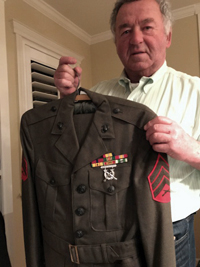
In what ways has TogetherWeServed.com helped you remember your military service and the friends you served with?
TWS has a great layout to formulated memories, add pertinent information, and have the ability to get in touch, pass the word, and read about other experiences. It is also a very fitting memorial place for those fallen and enables all of us to reflect upon them that will never be forgotten for all of our days.
